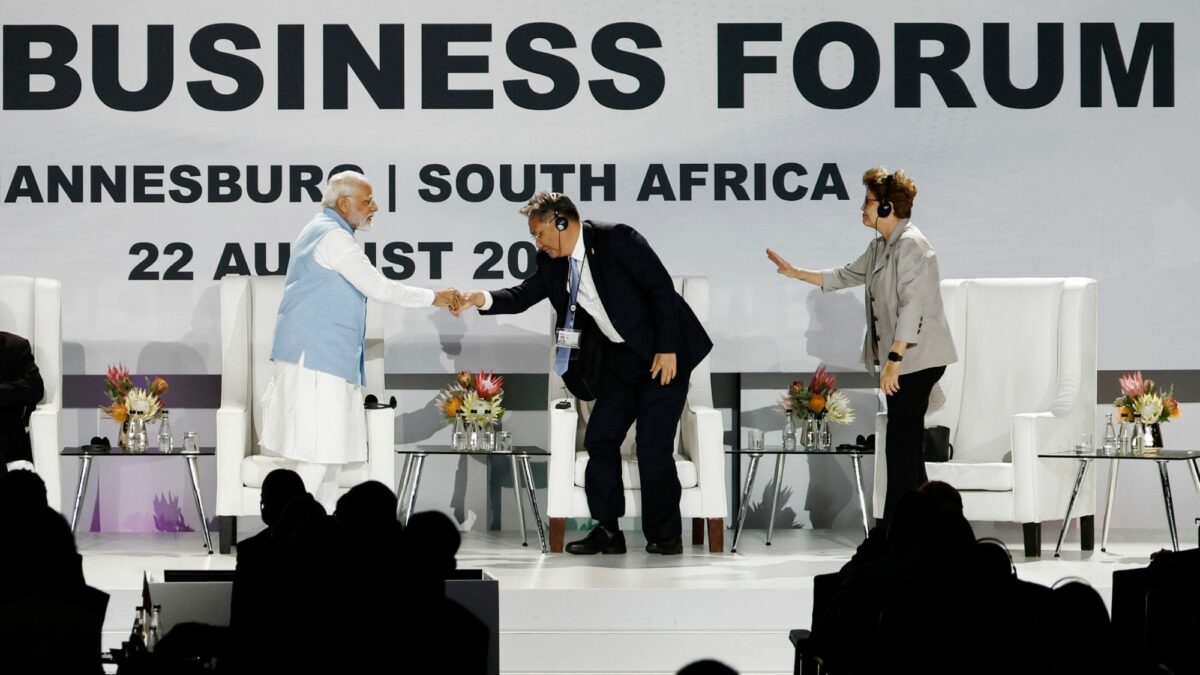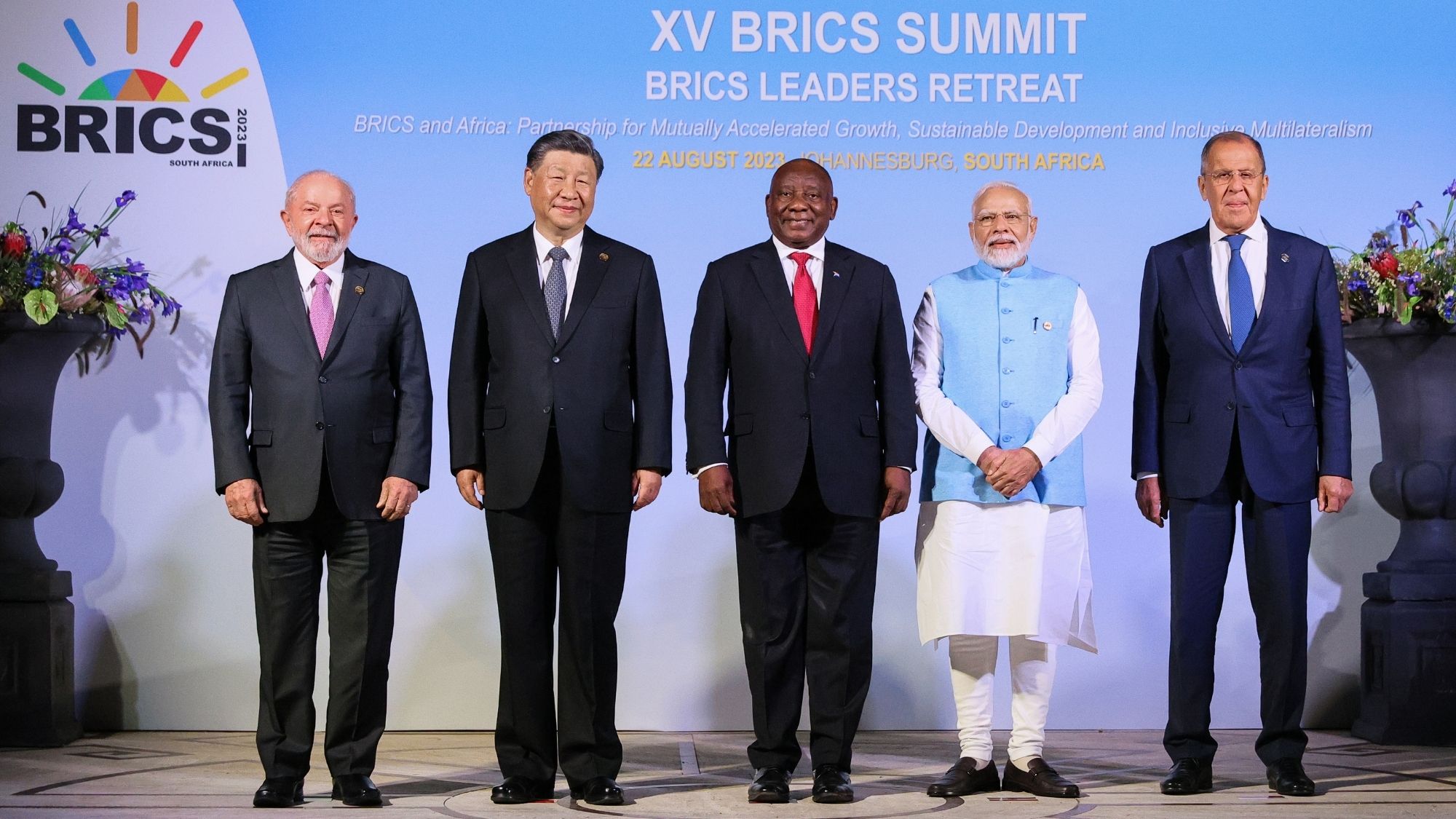Johannesburg — In a significant development, South African President Cyril Ramaphosa announced on Wednesday that the BRICS nations are contemplating expanding their membership. “It goes to show that the BRICS family is growing in its importance, in its stature and also in its influence in the world,” remarked Ramaphosa.
Middle Eastern countries, notably the UAE and Saudi Arabia, have expressed keen interest in joining the bloc. Their intent is driven by the prospect of strengthening trade ties with the 68 countries currently associated with BRICS. The shift towards local currency transactions, as an alternative to the US dollar, further accentuates this interest.
This year’s three-day BRICS summit in Johannesburg has been dominated by discussions on expansion, revealing underlying tensions among member nations. China, in its bid to counterbalance the United States, is pushing for rapid enlargement. However, India remains cautious, given its geopolitical rivalry with China.
Officials disclosed that nearly two dozen countries have formally expressed interest in joining BRICS, a bloc representing 40% of the global population and a quarter of the world economy. The summit saw participation from 50 heads of state and government.
#BRICSSummit2023#Indian Prime Minister @narendramodi sets out 5 suggestions for #BRICS collaboration, including in outer #space, #innovation, #skills development, protection of wildcats & in a repository of traditional #medicine.
— TRENDS (@mena_trends) August 23, 2023
Video credit: @BRICSza pic.twitter.com/2RA2eAcrCz
Despite their differences, BRICS nations share a common goal: challenging the Western-centric global order. The group operates on consensus, and leaders are currently deliberating the criteria for inducting new members. Ramaphosa emphasized that all BRICS nations have voiced support for expansion. Indian Prime Minister Narendra Modi echoed this sentiment, advocating for a consensus-driven approach.
Chinese President Xi Jinping, emphasizing the need for a more equitable global governance system, stated, “We gather at a time when the world is undergoing major shifts, divisions, and regrouping.”
The US, however, downplays BRICS’ potential as a geopolitical contender. The ongoing war in Ukraine highlighted the bloc’s divisions with the West, especially Russia’s stance, which is supported by other BRICS members.
Analysts believe that potential new members will force countries like Brazil, South Africa, and India to navigate their relationships with China and Russia carefully, considering their significant trade ties with the US.
The diversity of applicant countries, ranging from G20 members like Indonesia and Saudi Arabia to nations like Iran, which is antagonistic towards the US, underscores the bloc’s appeal. BRICS leaders believe this interest signifies the bloc’s resonance with the “Global South.”
However, there are concerns. Brazil’s President Luiz Inacio Lula da Silva supports Argentina’s entry but fears rapid expansion might dilute BRICS’ influence. Analyst Gustavo de Carvalho highlighted the existing divide among BRICS members, stating, “There is definitely a divide on BRICS members at the moment.”
What is BRICS?
BRICS is an abbreviation of the first letters in the English language for its member states, including Brazil, Russia, India, China, and South Africa.
#BRICSSummit2023#Russia's Foreign Minister Sergey Lavrov, heading the country's delegation, was received by @DIRCO_ZA Deputy Minister @alvinbotes as he arrives at the Waterkloof Airforce.@BRICSza @GovernmentZA @KremlinRussia_E pic.twitter.com/VxZO89iKMG
— TRENDS (@mena_trends) August 22, 2023
Oil heavyweight Saudi Arabia was among over a dozen countries which participated in the “Friends of BRICS” talks in Cape Town in June.
Algeria said in July it has applied for BRICS membership and to become a shareholder in the New Development Bank, the so-called BRICS Bank. The country is rich in oil and gas resources and seeks to diversify its economy and strengthen partnerships with China and other countries.
By 2050, the economies of BRICS are expected to compete with the economy of the wealthiest countries in the world today – according to Goldman Sachs, which was the first to use this term in 2001.
BRICS summit
BRICS represents about 30 percent of the global economy’s size, and the alliance produces more than a third of grain production worldwide.
Additionally, BRICS established a development bank with US$100 bn in capital to fund infrastructure initiatives.
On the first day of the summit on August 22 a business forum session will be held where the participating heads of state will deliver speeches. After that, the leaders will meet behind closed doors.
On August 23, two sessions will be held: During the first one, the leaders of the member states, along with ten representatives from each delegation, will discuss geopolitics, security issues, finance, and the economy.
The second public session will include representatives of the Business Council, the Businesswomen’s Alliance, and the New Development Bank.

At the end of the summit, the Heads of State of the Member States will adopt the Final Communiqué.
It is expected that the bloc will take advantage of the summit to launch the process of adding more countries to its membership, a campaign led mainly by Chinese President Xi Jinping and supported by Russia and South Africa.
In the second session, the summit is expected to discuss the common currency, as the group will revive the idea of reducing the dollar’s dominance in global trade payments. The debate about the single currency has re-emerged after the rise in interest rates and the Russian-Ukrainian conflict that led to the increase in the US dollar’s strength, along with the escalation of the cost of commodities priced in dollars.
Food security will be a significant topic on the agenda of the summit in light of the measures taken by India and Russia, which have contributed to raising global food prices.
India imposed restrictions on rice exports to protect its domestic market, while Russia withdrew from an agreement to guarantee safe passage for Ukrainian grain exports. These measures have worsened the food situation in poor countries.
Russian President Vladimir Putin will not attend the summit because of the international criminal order to arrest him on charges of war crimes against children in Ukraine. Putin will deliver a virtual speech, while Russia will be represented by its Foreign Minister, Sergey Lavrov.
Political advantage
For years, the leading emerging economies have grumbled about being sidelined by rich countries. The current state of fragmentation in the global system, with the exacerbation of differences between the United States and China and divisions over the Russian conflict with Ukraine, gives it a new opportunity to become a louder voice in the global south and perhaps to compete with the US and its allies.
BRICS challenges
BRICS faces many challenges as the economies of Brazil, South Africa, and Russia suffer from inadequate performance compared with the growth of China’s economy.
China and India rarely agree on anything, which is a fundamental problem. The two most populous countries have been in a border dispute for years. Their military chiefs agreed last week to work quickly to smooth over differences, but they are far from achieving an agreement, solution, a precondition for a meeting between Chinese president Xi Jinping and Indian Prime Minister Narendra Modi.








